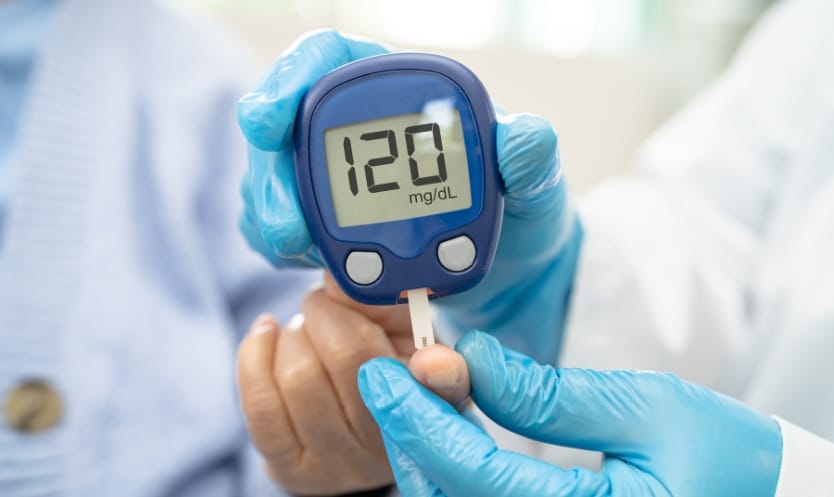Maintaining balanced blood sugar levels is critical for overall health, especially for people with diabetes. The body sends warning signs when blood sugar (glucose) levels become too high. Recognizing these early symptoms is essential to avoid complications and manage diabetes effectively. In this blog, we’ll explore five common signs that your blood sugar is too high, along with information about why they occur and what to do if you experience them.
Frequent Urination (Polyuria)
One of the most noticeable signs of high blood sugar is frequent urination, known as polyuria. When glucose levels in the blood exceed the kidneys’ ability to filter and absorb it, the body responds by flushing out the excess glucose through urine.
- Why it happens: The kidneys attempt to remove extra sugar by producing more urine, causing you to urinate more often.
- Impact on health: Increased urination can lead to dehydration, making it crucial to drink plenty of water when experiencing this symptom.
If you notice you’re heading to the bathroom more often than usual, it could signal that your blood sugar levels are too high, and immediate testing is recommended.
Constant Thirst (Polydipsia)
Another common sign of high blood sugar is excessive thirst, known as polydipsia. This is closely tied to frequent urination, as the loss of fluids prompts the body to seek hydration.
- Why it happens: Your body loses large amounts of water due to increased urination, triggering the sensation of thirst to compensate for the lost fluids.
- What to do: While drinking water is essential, managing the underlying cause is vital by lowering blood sugar levels.
If your thirst feels insatiable despite drinking plenty of fluids, it could indicate high glucose levels that need to be controlled.
Fatigue and Weakness
Feeling unusually tired or weak can be another sign that your blood sugar is too high or that you are suffering from diabetes. This happens because your body is unable to use glucose properly for energy.
- Why it happens: When blood sugar is too high, glucose stays in your bloodstream instead of being used by cells for energy. Without sufficient energy, you’ll feel fatigued.
- What it means: Chronic fatigue could mean your body isn’t managing blood sugar effectively, which can be dangerous over time.
If you’re feeling constantly tired without an obvious reason, check your blood sugar levels and consult a healthcare provider.
Blurred Vision
High blood sugar can affect your vision by causing the lenses in your eyes to swell, resulting in blurry or distorted vision. This can come and go depending on your blood sugar levels.
- Why it happens: Excess glucose pulls fluid into the eyes’ lenses, making it difficult to focus.
- Potential risks: Persistent high blood sugar can lead to more severe eye conditions like diabetic retinopathy, which can cause permanent damage if untreated.
If you notice sudden changes in your vision, particularly if you have diabetes, monitoring your blood sugar and seeking professional advice is essential.
Slow Healing of Cuts and Wounds
One lesser-known sign of high blood sugar is slow wound healing. High glucose levels can impair circulation and immune function, making it harder for the body to repair itself.
- Why it happens: Poor blood circulation and reduced immune function prevent nutrients and oxygen from reaching damaged tissue efficiently, slowing the healing process.
- What it signals: If you notice that cuts or scrapes take longer to heal, it could be due to uncontrolled blood sugar levels, which can also increase the risk of infections.
People with diabetes need to monitor any injuries closely, as even minor wounds can become problematic if blood sugar is too high.
Why It’s Important to Manage High Blood Sugar
Consistently high blood sugar can lead to a range of health problems, including damage to the heart, kidneys, eyes, and nerves. This is why recognizing the signs of high blood sugar early is so important. Left unchecked, hyperglycemia (high blood sugar) can develop into severe conditions like diabetic ketoacidosis (DKA) or hyperosmolar hyperglycemic state (HHS), which require immediate medical attention.
What To Do if You Notice These Signs
If you experience any of the above symptoms, lowering your blood sugar is essential. Here are a few steps you can take:
- Monitor blood sugar regularly: Use a glucometer to check your blood sugar levels and see how your body responds.
- Adjust your diet: Reduce your intake of sugary foods and carbohydrates to help bring blood sugar levels back to normal.
- Exercise regularly: Physical activity helps the body use glucose more effectively and can help lower blood sugar levels.
- Consult your healthcare provider: If symptoms persist or worsen, seek medical advice for a treatment plan tailored to your needs.
Long-Term Management of Blood Sugar Levels
Managing diabetes involves more than just reacting to high blood sugar spikes. It requires consistent monitoring, a balanced diet, regular physical activity, and potentially medication to keep glucose levels within a healthy range.
- Diet: Focus on whole foods, lean proteins, and fiber-rich vegetables to stabilize blood sugar levels throughout the day.
- Medication: If prescribed, use medicines like insulin or GLP-1 receptor agonists as directed by your healthcare provider.
- Regular check-ups: Regularly attend routine appointments with your doctor to adjust your treatment plan as needed.
Knowing the signs of high blood sugar is crucial for preventing diabetes-related complications. Recognizing early symptoms like frequent urination, excessive thirst, fatigue, blurred vision, and slow wound healing can help you take action earlier to manage your blood sugar levels effectively. Always remember that managing diabetes is a long-term commitment, and maintaining control over your blood sugar levels can significantly improve your quality of life. Stay informed, stay proactive, and consult your healthcare provider whenever necessary to ensure you’re on the right path to managing your diabetes.


